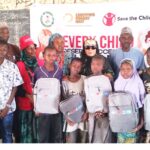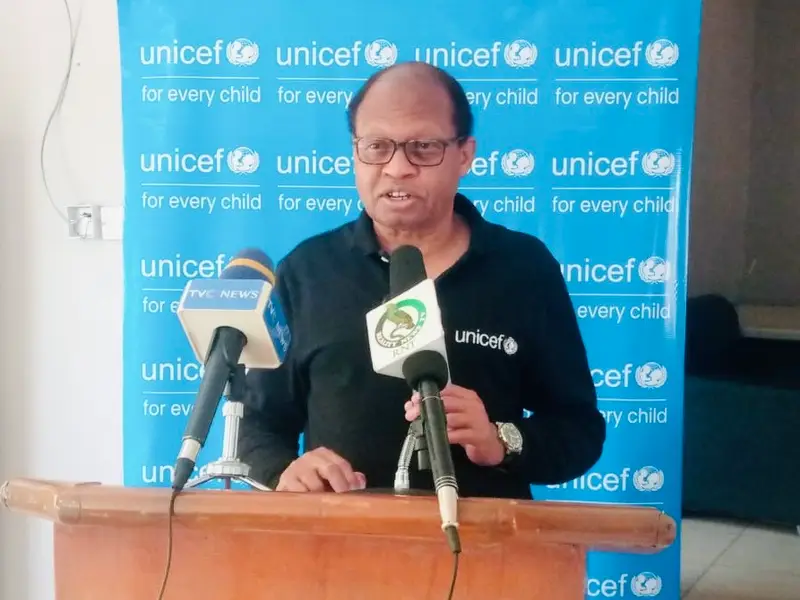By Zubairu Idris, News Agency of Nigeria (NAN)
There is a popular saying that “children are the leaders of tomorrow”.
Far from being just a feel-good statement, it underscores the fundamental truth that the future of any nation depends on how well it nurtures its youngest population.
For Katsina State, where more than 4.5 million of its estimated 9.6 million people are children, the challenge of securing that future is both urgent and complex.
Poor child health outcomes, low school enrolment, and widespread poverty continue to jeopardise the life chances of millions of children.
Recognising this, stakeholders in the state, led by the UN Children’s Fund (UNICEF), are calling for the institutionalisation of child-sensitive budgeting and planning as a key strategy for improving child development outcomes.
At a recent media dialogue in Katsina, Mr Rahama Mohammed-Farah, Chief of UNICEF’s Kano Field Office, said investment in children was “not only a moral obligation but an economic necessity.”
“Children are not just beneficiaries of our future, they are builders of it.
“This is why we need strategic and adequately funded actions embedded in planning and budgeting systems at every level,” he said.
Notably, Child-sensitive budgeting is an approach that ensures public budgets are planned, executed, and monitored in ways that directly respond to the needs and rights of children.
It involves allocating resources to critical sectors such as education, health, nutrition, water and sanitation, protection, and early childhood development.
Globally, countries such as South Africa, Bangladesh, and the Philippines have made notable progress in integrating child-focused indicators into budget tracking and performance systems.
These efforts are typically guided by the UN Convention on the Rights of the Child (CRC), which Nigeria ratified in 1991.
In Nigeria, frameworks such as the Child Rights Act (2003), and the National Policy on Children (2021), provide policy backing for child-responsive governance.
However, implementation gaps remain significant, especially at the sub-national level.
UNICEF’s latest data on Katsina reveals a sobering reality.
While government commitment has increased in recent years, outcomes for children remain among the lowest in the country.
One in six children (159 per 1,000 live births) do not survive to their fifth birthday, a stark indicator of gaps in child healthcare services.
Only 41 per cent of children are fully immunised, leaving the majority vulnerable to life-threatening but preventable diseases.
Additionally, 75.5 per cent of children are classified as multi-dimensionally poor, lacking access to healthcare, education, nutrition, and other essential services, while 61.2 per cent live in monetary poverty.
The data reveals that about one-third of children are out of school at the primary level, undermining the state’s long-term human capital and economic prospects.
In terms of nutrition, only 23.4 per cent of children aged 6–23 months receive the minimum acceptable diet, and 51.3 per cent of under-five children are stunted.
This indicates chronic malnutrition with long-term effects on physical and cognitive development.
Although budgetary allocations to sectors like education and health have increased in recent years, actual releases and utilisation remain inconsistent.
Mr AbdurRahman Abdullahi, Chairman of the Coalition of Civil Society Organisations (CSOs) in Katsina, shared his thoughts.
He said budget performance tracking from 2022 to 2024 revealed that actual releases for children-focused interventions were often lower than the approved allocations.
He identified limited fiscal autonomy, weak inter-agency coordination, and revenue constraints as major hurdles hampering effective implementation.
“The mismatch between budget approval and actual release has weakened impact, especially in rural areas,” he said.
“We need timely, adequate, and transparent financing”.
In response, the Katsina State Government has reaffirmed its commitment to child-sensitive financing.
Speaking at the media dialogue, the Commissioner for Budget and Economic Planning, Mr Malik Anas, said the 2026 appropriation would reflect stronger integration of child-focused planning.
Anas was represented by the ministry’s Permanent Secretary, Mr Tijjani Umar.
“Our ministry will ensure that all MDAs provide meaningful child-centred allocations during the upcoming budget cycle,” he said.
He added that training and budget review mechanisms were being strengthened.
Gov. Dikko Radda also made commitments during the 2025 Children’s Day celebration, where he hosted orphans and children with special needs.
He pledged that his administration would continue to protect children’s rights and prioritise their welfare.
“Every child is our responsibility. We will continue to ensure that their rights to education, health, and overall well-being are fully protected.
“As a government, we are your parents and we are here to serve you.
“I want to assure you that we will continue to associate with you and give special attention.
“All children deserve the opportunity to reach their full potential, and we will do everything within our power to make that possible,” Radda assured.
Participants at the media dialogue also stressed the crucial role of journalists in budget tracking, amplifying children’s voices, and holding leaders accountable.
Representatives of various media houses pledged to report consistently on child development indicators, funding trends, and service delivery gaps.
They also committed to translating complex budget data into compelling stories that the public can easily understand.
Equally important are the contributions of communities, religious leaders, and traditional institutions, who often serve as first responders to the needs of vulnerable children.
Stakeholders urged these groups to remain engaged and proactive in advocating for quality education, primary healthcare, child protection, and youth development at the grassroots level.
UNICEF and other development partners including Save the Children, the World Bank, and the European Union, have supported child-focused initiatives in Katsina over the years.
These initiatives include immunisation campaigns, school feeding programmes, and nutrition projects.
However, stakeholders stressed that the long-term sustainability of child-focused programmes depends largely on the ability of local governments to incorporate these priorities into their own budgeting and planning processes.
Mohammed-Farah emphasised the need to shift from reliance on donor support to increased domestic resource mobilisation.
“It’s time to move from donor dependency to domestic resource mobilisation.
“Investing in children today helps prevent higher social and economic costs in the future,” he said.
He noted investment in children’s welfare was the most strategic decision the government can make.
“It is an investment in Katsina’s future workforce. It is an investment that can break the cycle of poverty, enhance community resilience, and promote lasting peace and development,” he added.
Mohammed-Farah also warned that insufficient and poorly planned investments in children could lead to serious long-term consequences.
“Malnourished and uneducated children are less likely to become productive adults. Children without adequate protection are more vulnerable to abuse, exploitation, and recruitment by criminal groups,” he said.
He further explained that addressing the outcomes of neglect; such as poverty, illiteracy, malnutrition, and insecurity, costs far more than making early, preventive investments in child development.
“That is why we say prevention is cheaper than cure,” he noted.
In conclusion, stakeholders emphasised that child-sensitive budgeting is not merely a financial exercise but a clear demonstration of the government’s commitment to protecting and improving the lives of children.
They noted that if the Katsina State Government fully implements its child-focused budget plans, it can lead to measurable improvements in child health, education, and protection.
This, they said, requires timely release of allocated funds and a strong commitment to transparency in public spending.
They further stressed that effective coordination among relevant ministries and agencies is essential to ensure that resources are used efficiently and reach the intended beneficiaries.
Such an approach, they added, would help lay a solid foundation for inclusive and sustainable development in the state. (NANFeatures)
***If used, please credit the writer and the News Agency of Nigeria.












